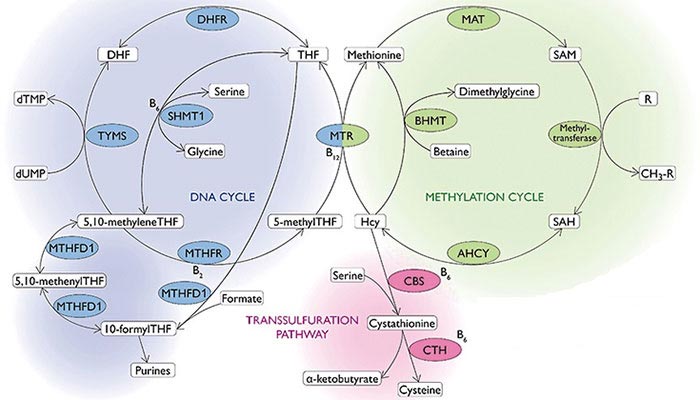
Many people have variations, or single nucleotide polymorphisms (snps), in their genes. But simply having a particular polymorphism doesn’t mean it requires treating. Gene expression is much more important and is influenced by stress, environment, poor nutrition, viruses and diseases. An snp may not cause much dysfunction when your diet, lifestyle choices and environmental surroundings are optimised.
The methylenetetrahydrofolate reductase (MTHFR) polymorphism is the best known snp. However, many other well-researched snps can play in important part in our health. These include methionine synthase (MTR), catechol-O-methyltransferase (COMT), cystathionine beta-synthase (CBS), serine hydroxymethyltransferase (SHMT) polymorphisms and many others.
Support for MTHFR polymorphism
Methylation is an essential biochemical process that is part of our metabolism. MTHFR is an enzyme that participates in your body’s folate and methylation cycle. MTHFR is needed to produce methylfolate, which recycles homocysteine, produces SAMe and recycles biopterin, all extremely important nutrients in the body.
If you have an MTHFR polymorphism, enzymatic reactions can slow down by 40-70%, leading to elevated homocysteine levels. You may have an increased risk of heart disease, general inflammation, difficult pregnancies and a diminished ability to eliminate toxins including alcohol.
When you can’t eliminate toxins efficiently, your body might accumulate heavy metals and suffer imbalances which bring other health issues. For an analytical review of a common imbalance, see effects of a low zinc to copper ratio.
You might also experience folate, vitamin B6 and vitamin B12 nutrient deficiencies. Symptoms include fatigue, premature grey hair, mouth sores, growth problems, brain fog, concentration issues, pale skin, lethargy, irritability and weakness.

Various Types of Folate
There are many types of folates, which are commonly known as vitamin B9. The three main types are:
1. Folic acid
Folic acid is found in many fortified foods, like fortified breads, grain products and cereals and also in some multivitamins.
Folic acid is not produced naturally and the liver can fail to convert it into its active form through the enzyme dihydrofolate reductase. When you over-consume folic acid, the body’s folate receptors block up, reducing the effectiveness of methylfolate and folinic acid in the body.
Excessive folic acid levels have also been linked to an increased risk of cancer. We recommend avoiding this form of folate, particularly if you have an MTHFR polymorphism.
2. Folinic acid (5-Formyl THF)
Folinic acid is a very important nutrient that supports DNA based production, mucous gut lining, hair, nails, eyes and skin. This is a more metabolically active form of folate than folic acid and is a better folate to supplement as the body can use various enzymes to convert it into any other form.
3. Methylfolate (5-MTHF)
Methylfolate supports methylation. It works together with methylcobalamin in more than 200 enzyme reactions in the body.
Methylfolate and methylcobalamin help to produce and recycle homocysteine through the methionine pathway. If this pathway is working inefficiently in your body, you may have high levels of homocysteine in the blood. This can be toxic to both vascular and neuronal cells. High levels of homocysteine are linked to heart disease, schizophrenia, Alzheimer’s disease and mood disorders such as depression and anxiety.
Supplementation of methylfolate can be beneficial as the body can use it as is or convert it back to folinic acid if needed.
However, supplementation of 5-MTHF must be started carefully. Initial doses that are too high can cause over-methylation, resulting in excess irritability, anxiety and a racing mind and body. Niacin can help to reverse the effects of over-methylation.
A whole blood histamine test and or a SAMe/SAH ratio test will give a good indication of your methylation status. If you over-methylate, you may not need this form of folate. However, it could benefit you significantly if you under-methylate.
The best dietary sources of natural folates are leafy greens, eggs, sprouts, beans and organ meats. Folates are very sensitive to heat and light, and are easily destroyed by most cooking methods. This makes leafy greens the preferred source.
Other ways to support Methylation:
- Avoid synthetic folic acid, common in processed foods
- Eat plentiful leafy greens
- Improve gut health
- Aid detoxification (for example - sweat through exercise, adopt a healthy whole food diet, consume adequate filtered water, brush dry skin, take saunas)
- Avoid excess toxins from the diet and environment
- Consider Methylated B vitamins as a supplement


Support for COMT polymorphism
COMT is an enzyme that clears dopamine, adrenalin, nor-adrenalin, estrogen and other catecholamines. When COMT function slows, your body does not clear these substances efficiently.
The COMT snp is related to breast cancer and other high estrogen cancers, as well as increased anxiety and irritability with people with excess dopamine and nor-adrenalin.
The COMT snp can be supported through supplements such as SAMe and magnesium. However, treatment must proceed with care as these measures could cause symptoms to worsen in some people, depending on diet, lifestyle, stress and methylation status.
[widget id="text-4"]
